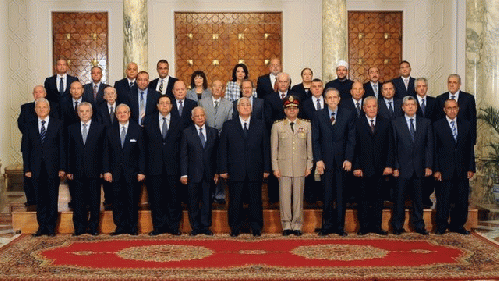By Nicola Nasser*
The internal crisis in Egypt has indulged the country in
its most critical foreign relations test since these relations were shaped by
the U.S. sponsored Camp David accords and the peace treaty with Israel in 1979.

Egypt interim government including General Abdel Fattah al-Sisi
(Image by in2eastafrica.net) Details DMCA
An indicator is the warnings against travel to
In the immediate proximity, and three days after the
ouster of the elected president Mohammed Morsi on July 3, the Peace and Security Council of the fifty -- four member
African Union decided "to suspend the participation of
On August 20,
South Africa, a leading member of the AU as well as the BRICS five -- member
association, issued a statement to remind the "interim government" in Cairo
that its " principled position is based on the Constitutive Act of the African
Union, where any unconstitutional change of government -- whatever the premise --
is specifically rejected" immediately.
So far, the AU reaction is ironically the
only concrete international diplomatic measure taken in defense of the western
widely trumpeted rule of law and democracy. The African "sphere" is
traditionally only second to the Arab one as a cornerstone of
However,
Most likely the U.S. allies' final
reaction will wait until the U.S. administration ends its open --ended stance,
but while U.S. allies follow in its footsteps, the U.S. rival world powers
grudgingly dealt with the emergence of the Muslim Brotherhood (MB) as the
leaders of the "Arab Spring" changes in Tunisia, Egypt, Yemen and Libya as a
fait accompli; the removal of the Egyptian MB from power is a welcome
development.
Next Page 1 | 2 | 3 | 4 | 5 | 6 | 7
(Note: You can view every article as one long page if you sign up as an Advocate Member, or higher).




